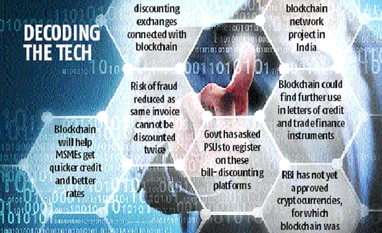Three platforms that offer Trade Receivables Discounting System (TReDS) — Receivables Exchange of India, A.TReDS, and M1xchange — implemented the use of blockchain in the enterprise financial segment.
The Reserve Bank of India (RBI) had introduced TReDS to facilitate financing trade receivables of micro, small and medium enterprises (MSMEs) from corporate buyers through multiple financiers.
Also Read
MonetaGo is a US-based blockchain firm that works with central institutions and financial organisations globally to implement blockchain.
All the three platforms, which work independently, are interlinked with blockchain and share data.
The implementation of blockchain will be helpful in MSMEs getting better rates and discounts.
After selling products to companies, MSMEs can present their bills of exchanges and financing companies discount them, irrespective of the creditworthiness of the sellers as they take the risk on the corporate buyer.
With three active exchanges, buyers as well as sellers could register on all three platforms, raising the chances of the same bill getting discounted twice. Hence, this will not happen after blockchain.
Kalyan Basu, chief executive officer and managing director, A.TreDS (Invoicemart), said: “The blockchain implementation will drastically reduce double-invoicing problems and financial frauds. The implementation process will also save MSMEs’ time spent on compliance issues.”
Bill discounting on online platforms has a huge potential as hardly 1-2 per cent of it has moved online and the implementation of blockchain in the initial phase of growth is seen as a milestone in the enterprise finance segment.
The first TReDS platform — the Receivables Exchange of India (RXIL), promoted by the National Stock Exchange and Small Industries Development Bank of India (Sidbi) — began operations a little over a year ago, when companies buying goods from MSMEs were discounting the bills and the seller MSMEs get the money faster.
Since then the two other exchanges A.TReDS, a joint venture of Axis Bank and B2B e-commerce company M-junction Services, and M1xchange, started by Mynd Solutions, started operations.
The government has asked all public sector enterprises to register on these bill-discounting platforms to enable MSMEs to get much-wanted liquidity.
Analysts see the next logical extension of blockchain in trade finance solutions such as letters of credit and bills of lading. Chenard said: “There is a lot of interest in bringing a variety of trade finance instruments on to blockchain networks and we are currently exploring a variety of implementations.”
The Reserve Bank of India’s (RBI’s) Institute for Development and Research in Banking Technology has completed a proof-of-concept of blockchain technology for a typical trade finance application with the active participation of National Payments Council of India (NPCI) and banks.
While the RBI has approved the implementation of blockchain technology for the financial sector, it hasn’t approved cryptocurrencies, for which the technology was innovated a decade ago.
The blockchain technology used in the bill-discounting network is Hyperledger Fabric, said Chenard.
To read the full story, Subscribe Now at just Rs 249 a month
Already a subscriber? Log in
Subscribe To BS Premium
₹249
Renews automatically
₹1699₹1999
Opt for auto renewal and save Rs. 300 Renews automatically
₹1999
What you get on BS Premium?
-
Unlock 30+ premium stories daily hand-picked by our editors, across devices on browser and app.
-
Pick your 5 favourite companies, get a daily email with all news updates on them.
Full access to our intuitive epaper - clip, save, share articles from any device; newspaper archives from 2006.
Preferential invites to Business Standard events.
Curated newsletters on markets, personal finance, policy & politics, start-ups, technology, and more.
Need More Information - write to us at assist@bsmail.in
)